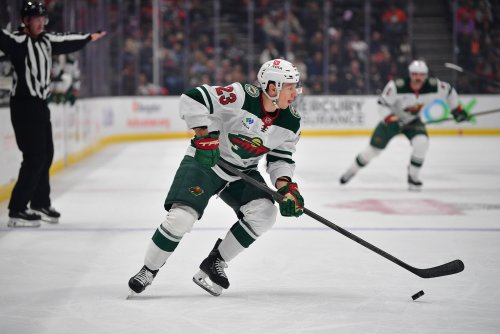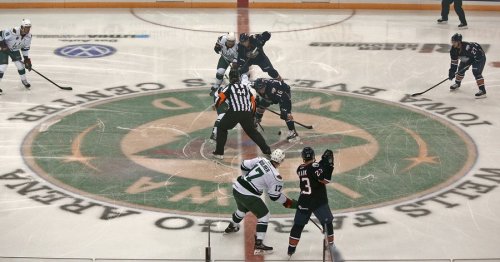
Last Sunday was one of those sleepy, too-hot days around the midwest. Add to that the August-induced malaise around the NHL and I wouldn’t blame you if the Wild's re-signing of Brett Bulmer didn’t get your attention. It’s a limited contract at one year, and as the Star Tribune’s Michael Russo notes Bulmer "has a lot to prove." It’s not exciting news, but it’s news.
I won’t claim here that Bulmer’s signing is revolutionary for the Wild, and I won’t pretend like we should expect great things from him going forward, because I honestly don’t expect much. Given Bulmer’s history of injuries, his ability to indiscriminately get under the skin of, opponents, coaches, and teammates, he’s looking more and more like a project that just won’t work out. So the one year extension is a bit surprising, but it’s also a low-risk deal that gives the team some flexibility in Iowa at a time when the squad in St. Paul is Backstrom’ed into a corner by unmovable contracts.
On the surface, that’s what the Brett Bulmer signing is: a low-risk extension on a player with a lot of downside and a lot of work to do. But the move also gives us a chance to look at what reclamation projects can turn into. Most of the players on this list are well outside the range of what we should expect from Bulmer, but they’re a good reminder that being "un-coachable," being a "bad fit," and having a down year or two early in a player’s career aren’t always predictive of their future in the league.
Phil Kessel
On the other hand, he’s a more prolific goal scorer in the NHL than you or I, and all but six players in the NHL since the beginning of the 2008-09 season. So what gives? Even before the recent public, not-completely-overblown fan and media frenzy around Kessel’s play and attitude, the Boston Bruins sank their teeth into one of the University of Minnesota’s most successful NHL products. Before it was cool in Toronto to knock Kessel’s diet or attitude, fans in the Boston media dug into the emerging scorer for inconsistencies on the ice and his failure to deliver on expectations they, not he, set.
Nevertheless, given a chance to mature in a different market (albeit one which still soured on him around the five year mark probably because 1967 is a thing), Kessel grew into an elite scorer who, despite losing value over the preceding years, commanded a high price on the trade market. Phil Kessel is a player who still has a mountain of untapped potential, but, in the end, it’s the fans who have set their own expectations on his shoulders. The development of Kessel into an elite-level scorer in the NHL is not by chance or by accident – it’s the product of coaching
Tyler Seguin
Cut to the 2014-15 season and Seguin is one half of the best buddy cop show in the NHL and among the league’s elite scorers. Largely, Seguin’s emergence is the product of a cast of complementary players like Jamie Benn, expectations of growth rather than results, and a chance to step up and be a leader.
For some young players, maturation comes naturally. For others, the combination of innate skill and extreme youth leads some players to simply crack under the pressure and either underperform or act out in unpleasant ways. The stress of problem children on both their fanbase and the organization pushes many of these players to their limit. But sometimes it’s realizing that the end of the line is near that forces players like Kessel, Seguin, and even someone like Jakub Voracek whom under-performed early in their careers to realize their potential.
Maybe it’s obvious that there are virtually no circumstances in which Bulmer develops into a player of this caliber. We’ve already seen some of Bulmer’s (lack of) production at the NHL level. In 9 games with the Wild in the 2011-12 season, he produced 3 assists. In 5 games during the 2013-14 season, he put up 0 points and 2 PIMs. Not exactly a large sample, but that’s the point here. Bulmer’s career with the Wild organization has seen him bounce back and forth between the WHL, the AHL, and the NHL, which suggests attitude problems, conditioning problems, or some combination of the two. So, short of surgically-replacing his arms, legs, and everything else required to play hockey at an elite level, Bulmer can’t hope to turn into a Seguin or a Kessel. Fortunately, the Wild in recent years have become an island of misfit toys and give us two great examples of what can happen when a problem child sees the light.
Nino Niederreiter
Drafted 5th overall in the 2010 NHL Entry Draft, Nino Niederreiter bounced around Garth Snow’s cupboard for three years to varying degrees of success and misuse. Niederreiter’s usage during those years became a sticking point with the strong right winger, and his honesty about that fact didn’t endear him to the fanbase. In the end, Niederreiter wound up with the Wild as a part of a deal that sent the New York Islanders a third round pick and 1840’s river fur trader Cal Clutterbuck. Since that point, Niederreiter has grown alongside a strong core of young players and behind a slew of good-character, hard-working veterans. In a new atmosphere and trusted with a growing spot on the roster, Niederreiter’s play has impressed fans and gotten him back on track with where his 2010 draft scouting report placed him.
Jared Spurgeon
Until now, we’ve looked only at players who have been problems for their teams because expectations were set so high by their draft position. We’ve also only talked about players who came to their new teams via trade. However, Bulmer’s situation could have easily gone another way. In 2010, Jared Spurgeon wasn’t offered a contract by the (you guessed it) Islanders, leading him to accept an invite to the Wild’s camp and ultimately to the roster spot he holds today. In the time since his trade, Spurgeon has defied the criticisms which cost him his spot with the Islanders and has found himself looking at a sizable extension a few years from now. Part of his development over the past seasons has certainly been due to his dedication to conditioning and personal development, but another large part is likely due to the opportunity afforded to him by the Wild’s system and the chemistry he has developed with linemate Marco Scandella.
In both Niederreiter's and Spurgeon’s cases, a change of scenery and proper usage have given them the opportunities they have needed to develop. However, their paths to these opportunities couldn’t be more distinct. Sometimes players and teams just aren’t good fits for one another. For Spurgeon, the right fit has been with the Wild and not the Islanders. The question for Bulmer, then, is whether holding onto him will help or hinder his growth as a player. Fortunately, given the structure and term of Bulmer’s contract, the answer to this question won’t be costly for either side.
Think you could write a story like this? Hockey Wilderness wants you to develop your voice, find an audience, and we'll pay you to do it. Just fill out this form.









Recommended Comments
There are no comments to display.
Join the conversation
You can post now and register later. If you have an account, sign in now to post with your account.
Note: Your post will require moderator approval before it will be visible.